7 Types of Humour that will Transform your Brand Voice
So you think you’re funny, huh? Are you always the first to throw a quick-witted burn or a spicy meme into your WhatsApp group? Do you often get the feeling you could give the open-mic comics at your local dive bar a run for their money? Or perhaps, at the tender age of 36, you hold on slightly-too-tight to your former title of ‘class clown’.
In the business world, it might seem like there isn’t much room for banter. It’s more stock reports than knock-knock jokes in your office. What if I told you that improving your business’ reputation and revenue is possible by dusting off that funny bone and giving it a good old tickle?
How so? You say with suspicion. Well, my friend, it’s all about your voice - and I don’t mean how well you can belt out Whitney Houston in the shower... No, I’m referring to your Brand Voice; a feature of your business that holds a world of comedic potential, depending on your products or services.
What is Brand Voice?
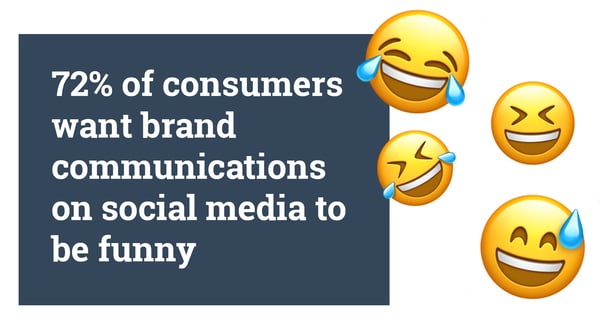
Source: Sprout Social
To understand brand voice, we first must define the meaning of a brand. Experts differentiate brands from the items they represent due to the specific values attached to them. A brand is a concept thought up by the team who launch a business. This team outlines a range of values that they want the brand to convey to an audience. These values could be anything from trustworthiness to wild-adventurer.
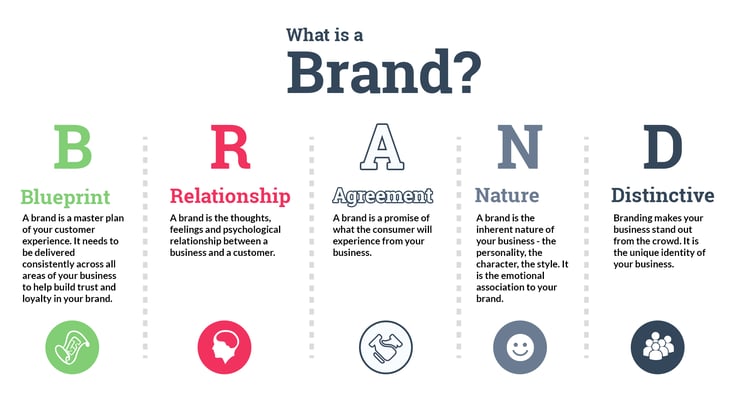
Source: Black Mouse Design
Brands are not built by business executives alone. Instead, brands take on a life of their own; they are defined personally by consumers through each advertising impression, every comment from a friend, or an encounter with a staff member ... and so on.
Every touchpoint counts towards your customer’s perception of your brand, so how you communicate with them is vital. This is where brand voice comes in. Brand voice is the tone, personality and emotion interjected into your business communications.
A consistent brand voice helps to build strong customer relationships and boosts consumer recollection of your business. Pretty much every market in the world is now saturated; a unique and memorable brand voice is the key to helping you stand out from the crowd.
Finding your Brand Voice…
Your brand voice should meet at the intersection between what you want to convey about your brand, and how users should feel about your brand. The Content Marketing Institute (CMI) recommends that businesses attempting to pinpoint their brand voice summarize their style in 3 words. For example, Hurree’s brand voice is casual, informative and friendly.
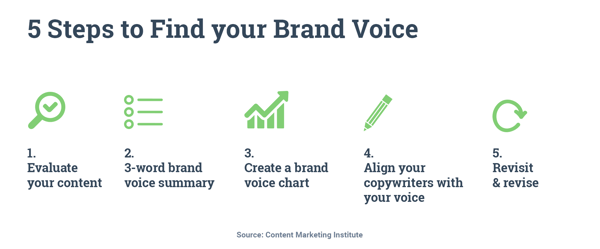
There’s one thing that CMI hasn’t mentioned in their 5 steps, however, and it’s quite possibly the most important step of all: Identifying your audience.
How can you figure out your brand’s voice if you don’t even know who you’re talking to! Developing a segmentation strategy at the beginning of your brand voice journey is vital in order to understand the types of customers your brand will be targeting. To do this, perform detailed research into your prospective market and leverage data to create your ideal user personas and their corresponding segments.
Related reading: Market Targeting: Why it Pays to Differentiate
Segmentation will give you a much clearer understanding of who your customers are, what kind of brand voice they will respond positively to, and which approaches to avoid. After all, there are a number of audience characteristics that may impact your customer’s voice preferences, like their age, gender, culture or which language they speak. These preferences are particularly important to consider when undertaking humor as certain jokes may be highly humorous to one group but offensive to another.
Using Humor in your Brand Voice
As a concept, humour can be defined as any act which attempts to provoke laughter or provide amusement. Studies show that humour can have positive physical and psychological effects, reducing stress and anxiety by releasing endorphins into the body.
A humorous brand voice is a valuable attribute for your business as it has been proven to improve customer-brand recollection and build trust. That is, only if you have identified that this tone is in-line with your brand personality, and therefore humour is the correct way to speak to your audience.
Jack Barclay, Brand Voice Strategist at The Brand Voice Guy, states that it’s not enough for a brand to be generically ‘funny and quirky’ in today’s over-saturated market. Brands like Innocent got in early with their stand-out humour and copy cats swarmed quickly. Instead, Barclay recommends you carve out your own niche that tailors the style of your humour to directly serve the needs of your audience and differentiates you completely from your competitors.
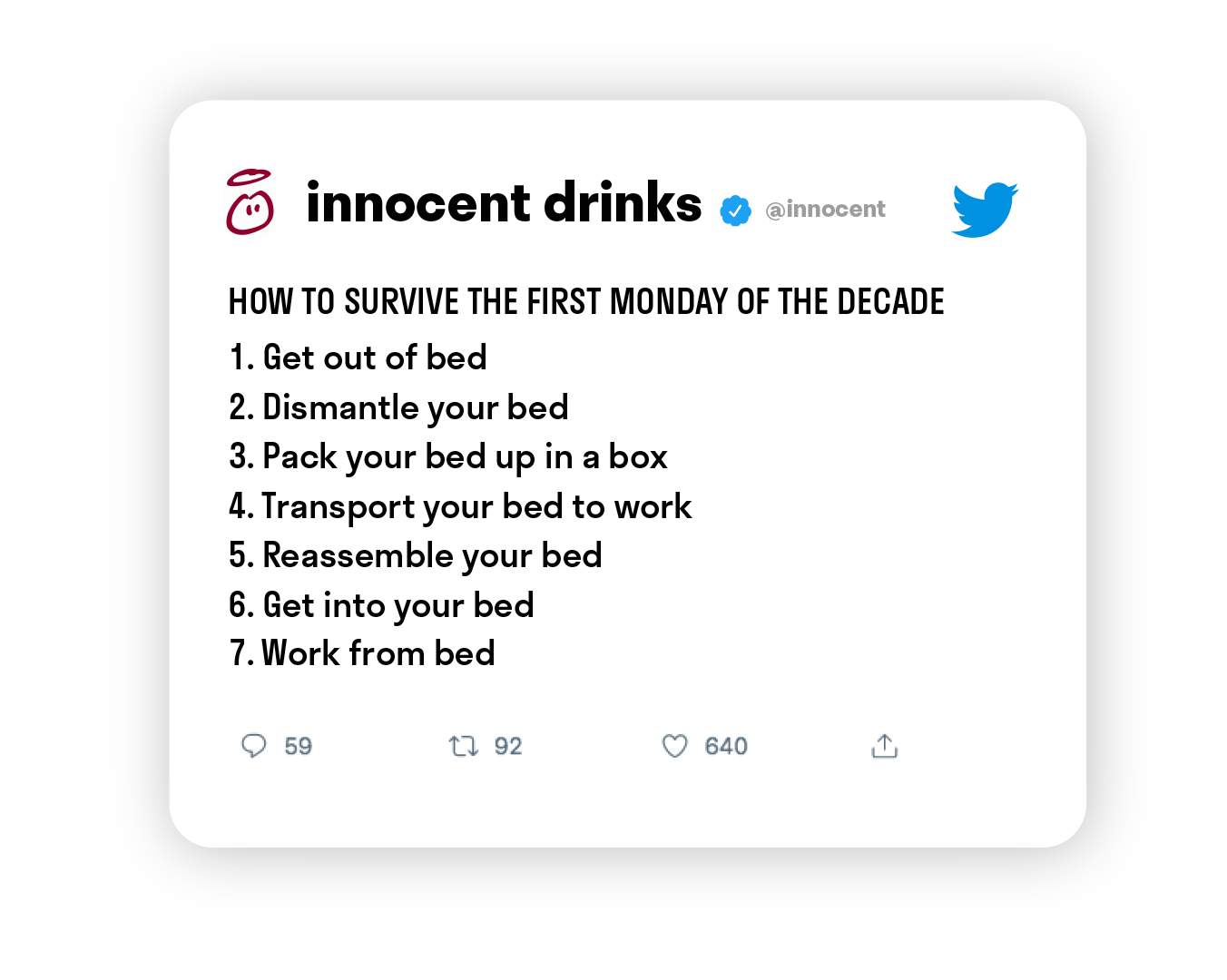
The thing is, humour is highly subjective; the same kind of humour doesn’t work for everyone. The type of humour that you use needs to fit with your products or services, and the characteristics of your segments.
Luckily, there are plenty you can choose from, so let’s take a look at 7 different types of humour and how brands are using them to reach their target segments…
1. Irreverent Humor
Let’s dive straight in with a type of humour that is certainly not to everyone’s tastes but when done well, can pack a serious punch. Irreverent humour is distinctly dark in nature; it intentionally disrespects topics that are usually held sacred. And, according to Cognitive Processing, enjoying dark humour means you’re more likely to be highly intelligent.
One brand completely killing the game (excuse the pun) when it comes to irreverent humour is DeadHappy. This life insurance company couldn’t stand out from its competitors more if it tried.
The brand targets the millennial generation by laughing death in the face - literally, their logo is a laughing skull. Their cartoonish mascot and bright colour schemes, coupled with clever wordplay in their digital advertising takes a notoriously dull and uncreative industry and breathes life into it.
It’s likely that if your audience segment is older in age, irreverent humour won’t work for you, as poking fun at religion, death or other established norms is much harder for those with traditional views. Do your research and if you think your audience can take life with a pinch of salt, go irreverent.
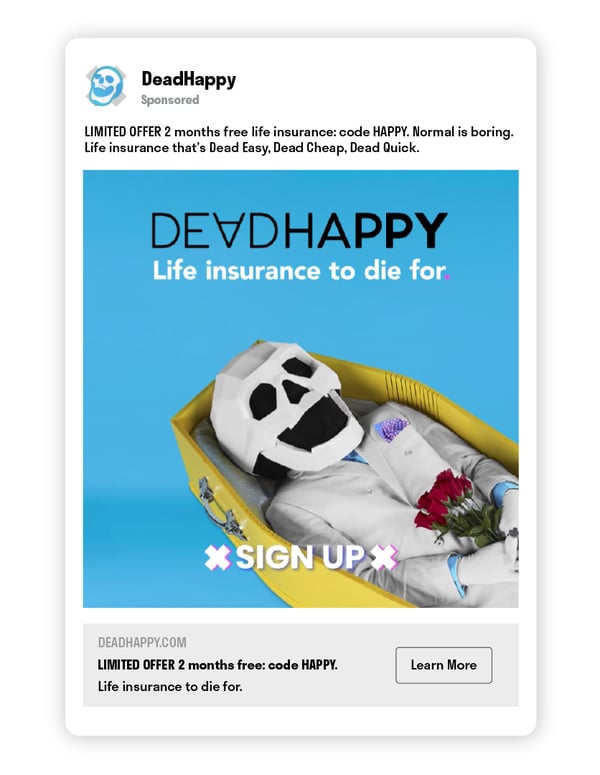
2. DeadPan Humor
If you, like the team here at Hurree HQ, are big fans of The Office you’ll know exactly what I mean by deadpan humour. It’s the so-blunt-it’s-almost-awkward type of comedy that has you squirming in your seat with its raw, emotionless delivery. The term itself refers to the blank look on the face of someone telling a deadpan joke, with ‘pan’ being an old slang word meaning face.
So how can a brand utilise deadpan humour? Well, as you can see in this viral Dollar Shave Club advert from 2012, which currently stands at 26,644,809 views on YouTube, deadpan humour is a great way for brands to deliver a lot of information about their product in a creative and humorous way.
3. Observational Humor
Have you ever read something funny from a brand and thought “It Me”? Observational comedy is all about turning our everyday quirks into relatable jokes; the humour lies within the ability to see ourselves in the punchline. It’s the “I do that” moment that lands the laugh and with the rise of meme culture, there’s never been a better time to build engagement by sharing funny observations.
Above all, to perfect observational humour, you need to know your audience inside and out. What unites them, what do they love, hate, what’s their guilty pleasure or that slightly embarrassing habit that they wish they could break? Figure that out, poke a little harmless fun, and bang! You’re an observational comedy whiz.
Take this status from BarkBox, a dog treats company that has really perfected their ‘That Feeling When’ bond with their audience. Observations like this one come with a deep, personal understanding of the audience and their use of dog-owner language.
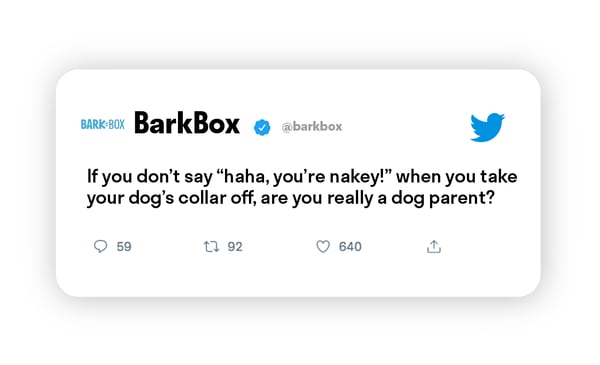 Observational humour can build wonderful communities with consumers and the brands they love. Just check out the 774 comments under that post. And, an added benefit of this type of marketing humour is that it’s super easy and costs nothing to replicate as memes are free from copyright!
Observational humour can build wonderful communities with consumers and the brands they love. Just check out the 774 comments under that post. And, an added benefit of this type of marketing humour is that it’s super easy and costs nothing to replicate as memes are free from copyright!
4. Absurd Humour
Let’s get weird! Absurd humour pushes the boundaries of the predictable and plunges you into the world of the surreal. If you watch the news, you’ll know that we live in a pretty absurd world right now. So something a little bit out there, a little bit silly can be the perfect medicine to distract and delight your customers.
Old Spice are the masters of the absurd and their brand voice is just downright weird. But you know what, it works! Old Spice is an inexpensive product; the brand targets young men aged around 16 to 30 and this wacky humour is totally shareable for their market. The random quality of their output sounds just like the thoughts of a teenager or young adult, which suits their target segment down to a T. It’s topsy-turvy fun and highly memorable, hitting that absurd-humour sweet spot.
5. Blue Humour
Make sure your parents are out of the room for this section because it’s time to talk about the blues. And no, I don’t mean that sad-clown kind of humour; blue comedy is all about being risqué or even indecent... But most often, it’s about sex. Blue humour takes a topic usually left for the privacy of our bedrooms and lays it bare for all to see.
Now, using blue humour in your marketing takes some creativity… We’re all adults here, but even a hint of anything too explicit and your communications could be banned from television or ripped off social media. You want to be funny, not tarnish your reputation.
Only tackle blue humour if it’s really suitable for your brand and if you do it, be clever. Take this print advert from Durex, a well-known British condom brand. The product and topic at hand are clear, however, the styling and concept of balloon animals are palatable to the average consumer and adds a level of whimsy that keeps things... safe.
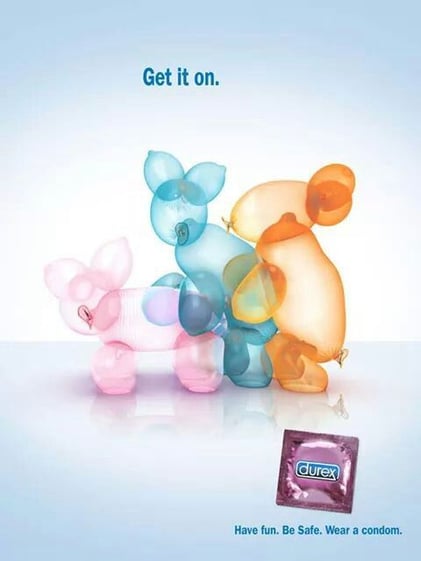
6. Topical Humour
To crack the topical humour code, you need to have your finger on the pulse when it comes to news and current affairs. That, and your audience needs to be equally as clued up! There’s no point picking out a tasty Love Island meme, doing the hard work to relate it back to your brand, only to share it with your audience of middle-aged men who only like golfing. They will not have a clue!
Go for big news stories and accessible topics; things you know for sure your audience will recognise and find hilarious. Avoid obvious tragedies and crimes at all costs, but don’t be afraid to get a little close to the bone.
Take this example from Burger King; their recent topical post about a certain Prince and [redacted for legal reasons]... This kind of communication will certainly turn heads.
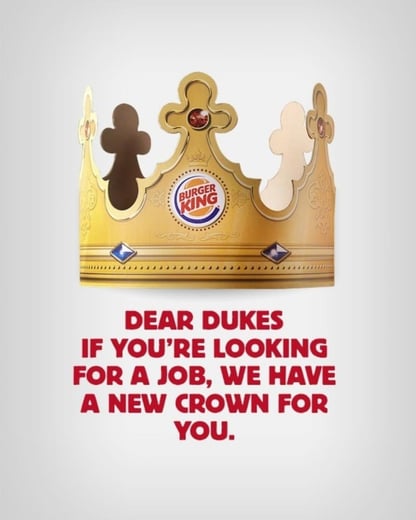
7. Wordplay
Last, but certainly not least we’ve come to wordplay; the copywriter’s best friend. Wordplay can liven up any marketing communication, adding some light-hearted humour that’s easily accessible for both risque segments and more traditional consumers.
Even the simplest play on words or double meaning can create something remarkable that will tickle your customers and create the brand recognition you crave. Stabilo, who are quite possibly the only name in highlighter pens, have chosen to inject humour into their playful brand voice.
The use of wordplay and visual humour here elevates what could be a fairly dull post about highlighter pens to a new, chuckle-worthy level.
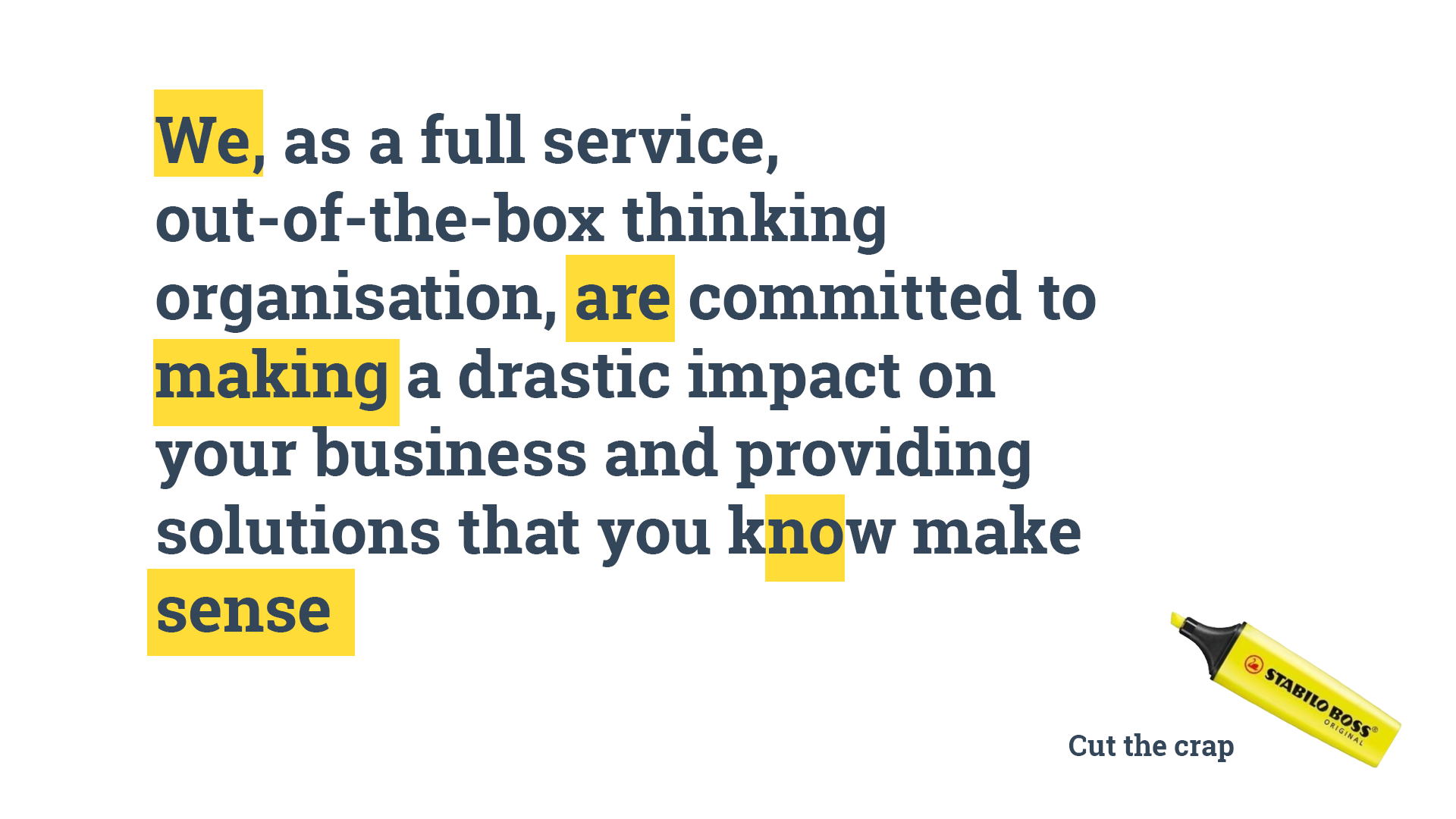
Thanks, I’m here all week…
I think we’ve proven that a dash of humour in your campaigns can liven up even the dullest of products!
Stay consistent, creative, and aware of what is appropriate for your audience. These are the three golden rules when it comes to being the funny brand you know you can be. Remember to be mindful that any level of humour has the potential to offend - it’s not just the snowflakes you need to be afraid of.
Always invest in top-level branding and audience research before choosing your brand voice and monitor your audience engagements before, during and after each humorous campaign. This way, you will avoid hurting anyone’s feelings. After all, what’s a joke between friends?
Now, get out there and make them laugh!
Share this
You May Also Like
These Related Stories

The 4 Common Mistakes When It Comes to Building Your Brand

How to Measure Brand Awareness: 7 Metrics to Track


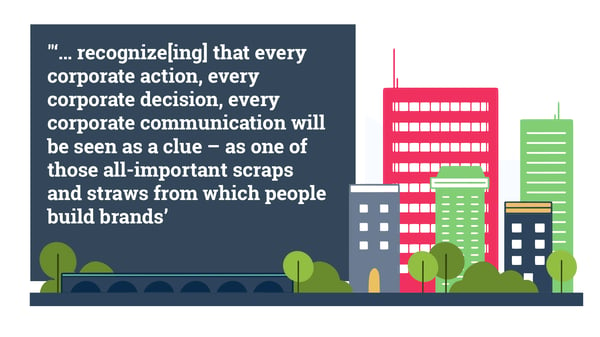 -
- 
